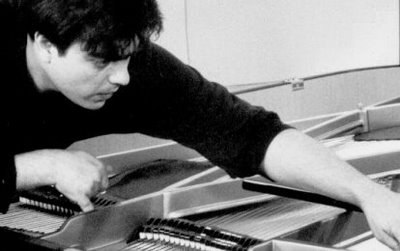Our weekly listen and look at composers and performers that you may not know yet, but should… And can, right here and now, since they’re nice enough to offer a good chunk of listening online:
Johnny Chang (US / L.A.)
Violinist/composer/provocateur and eternally-hopeful Dodgers fanatic, Chang brings his amazing awareness and technique to everything from the toughest scores to the freest sonic explorations. Some of this exploration goes far enough to make you wonder “where’s the violin?”; but once you realize the point isn’t so much listening to the violin as it is to the violinist, you’ll be fine. This is ably documeted at his site, where under the “music” button you’ll find recordings of pieces by Cage, Brown, Pisaro, Saunders, Carter, Crane and Overton. Chang’s own inward-looking and intensely focused compositions can be heard on the same page. As a bonus, links on the main page will let you hear his collaboration with wonderful cellist Jessica Catron, called the Microscore Project. It’s whole slew of specifically-commissioned pieces, all running 30 seconds or less.
Alejandro Viñao (b. 1951)
Born and raised in Argentina, but long a British resident and citzen, Viñao’s work has been heard regularly across Europe and Asia, but fairly rarely here in the U.S. His own description of his music: “…characterised by the use of pulsed rhythmic structures to create large scale form, and by a melodic writing which — as in the case of much non-European music — develops through rhythm rather than harmony.” I’d call it “tough-lush”, a lot of color and propulsion, but also real “lines”. (A fun surprise is when exotic instruments show up in the thorny textures, no apologies offered!) The link “audio excerpts” will take you to good-sized excerpts of his work; don’t forget to follow the special link from that page, that takes you to an extensive taste of his opera “Rashomon”.
Laetitia Sonami (b. 1957 — France / US)
Cribbing her own bio for the basics: Laetitia Sonami was born in France and settled in the United States in 1975 to pursue her interest in the emerging field of electronic music. Her work combines text, music and “found sound” from the world, in compositions which have been descibed as “performance novels”. She is creating and utilizing some of the most sophisticated technologies in order to create an intimate, spontaneous art form which transcends technology…. If you have trouble picturing this, all I can do is tell you to listen. While Sonami’s site (linked above) has short audio clips to hear, where I really want to send you is to a complete recording of her work “She Came Back, Again“, courtesty of the Other Minds Archive at Archive.org (coincidentally, Other Minds just happened to announce their 12th festival program this week). This is a live performance from the Other Minds Festival #4, November 10th, 1997. Slightly surreal, austere, almost autistic yet strangely sensual, the piece is a waking dream, maybe a fairy tale, but I think just as much the musical equivalent of a David Lynch film.



